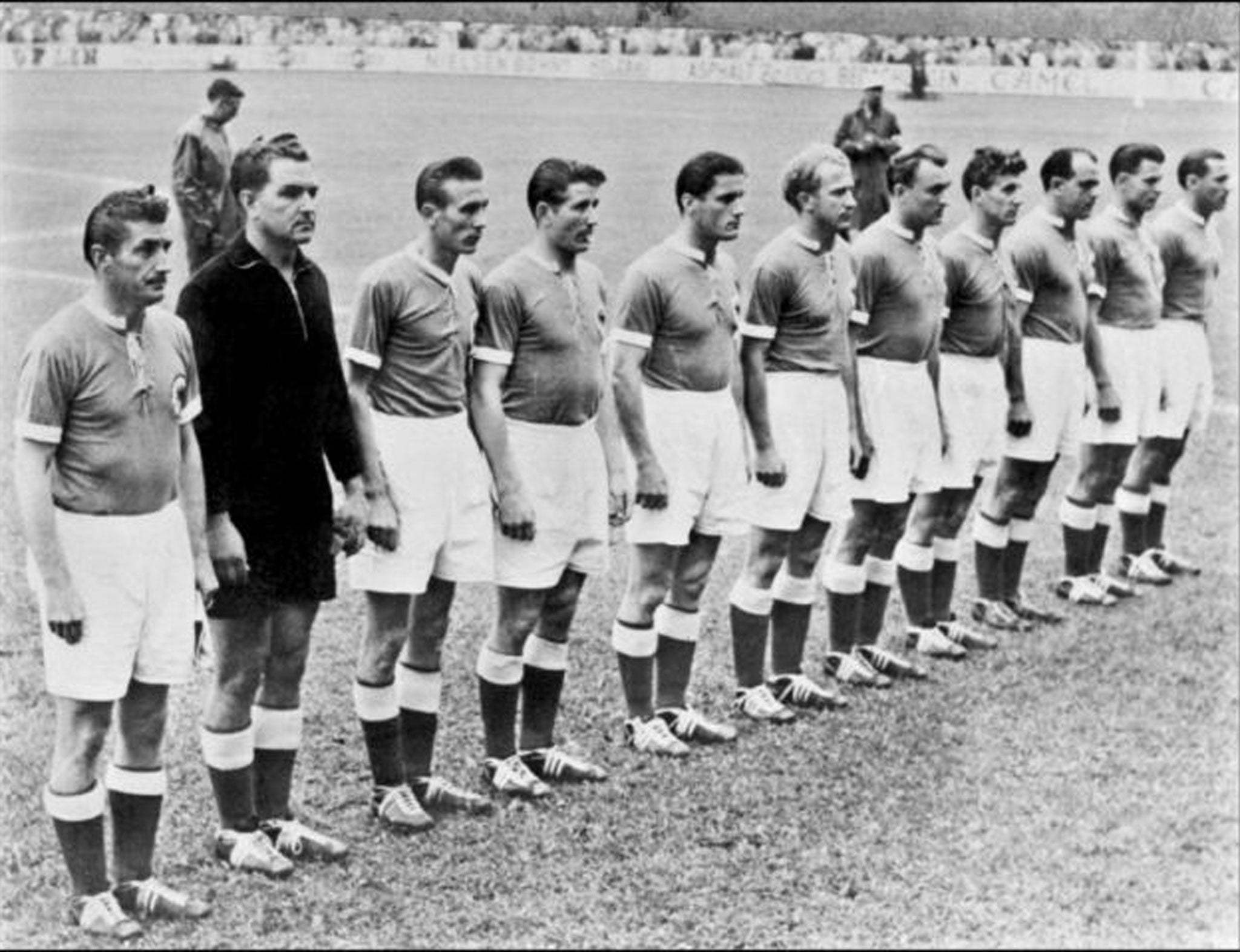Ottmar Walter: Footballer who helped West Germany triumph in ‘The Miracle of Berne’ in 1954
He served in the German navy during the war, which he ended with shrapnel ‘in my entire body’

West Ham supporters, noting the parts played by Bobby Moore, Geoff Hurst and Martin Peters in England’s 1966 triumph often boast that their club won the World Cup. Fans of 1 FC Kaiserslautern make similar tongue-in-cheek claims about West Germany’s success in 1954, although the death of Ottmar Walter means only one of the five “Red Devils” who shared in “The Miracle of Berne” remains alive.
Kaiserslautern, a south-western city which was then home to fewer than 80,000 people and is twinned with Rotherham, gave the West Germany team four friends from one area: Ottmar and his older brother Fritz, Werner Liebrich and Werner Kohlmeyer. Joining them from the city’s Oberliga club was Horst Eckel; he and Cologne’s Hans Schäfer, now 81 and 85 respectively, are the last survivors of the side that beat firm favourites Hungary to become world champions.
Ottmar, who was 89 and died in a care home, was an orthodox centre-forward. Fritz was the more influential player, a deep-lying, clever, skilful inside-left who was the national coach Sepp Herberger’s captain and strategist. Yet Ottmar’s phenomenal record of 336 goals in 321 games for FCK, like his impressive total of 10 in 21 internationals, is testament to his finishing prowess.
Another brother, Ludwig, also played for Kaiserslautern briefly before injury ended his career. The boys’ background was not sporting – their father was a lorry driver and restaurateur – and “Otte”, who was called up to the German navy after his Kaiserslautern debut in 1942, finished the Second World War with shrapnel “in my entire body”, but particularly in his right knee, after his ship was sunk near Cherbourg with the loss of all but 11 of the 136 on board.
After two years in POW camps, he resumed playing in the 1946-47 season with the only senior club he served. FCK’s first national title, in 1951, was sealed by Ottmar’s goals in a 2-1 defeat of SC Preussen Münster before 85,000 spectators. Atletico Madrid, who had won back-to-back championships under Helenio Herrera, tried to lure him and Fritz to Spain with astronomical offers. They were spurned, the DFB (German FA) having warned that any player joining a foreign club for financial reasons would not be considered for the next World Cup.
That year the brothers represented West Germany together for the first time. Ottmar added further goals against the Republic of Ireland, France, Spain, Norway and the Swiss in the build-up to the finals. In the tournament itself, in Switzerland, he soon scored in a group game and a play-off, both against Turkey.
Sandwiched between those matches was a group tussle with Hungary, for which Ottmar was one of seven first-choice players rested by Herberger. The Magyars won 8-3, but the wily Germany coach had gambled on being able to beat South Korea or Turkey in a play-off, earning a quarter-final against Yugoslavia rather than Brazil. His plans came to fruition, although West Germany were underdogs in their semi-final against an Austria side regarded as technically superior. In the event, Ottmar converted two headers and Fritz a brace of penalties in a 6-1 rout.
The final was a re-match with Hungary in Berne’s Wankdorf Stadium, and another heavy defeat loomed when the Germans trailed 2-0 after eight minutes. The Hungarians were unbeaten in four and a half years, and yet, with six minutes remaining, the score was 2-2. Then, Schäfer crossed, Ottmar challenged Milhaly Lantos and the headed clearance fell to Helmut Rahn. The Rot-Weiss Essen winger’s second goal prompted a Kenneth Wolstenholme moment from radio commentator Herbert Zimmermann, who, after declaring “Call me mad, call me crazy, but Germany lead 3-2 with five minutes left”, went on to proclaim “a miracle”.
West Germany’s achievement, built on teamwork, resilience and no little invention, was hugely symbolic for a country bent on an economic miracle after the grief, shortages and humiliation that followed defeat in the war. In 2003 it was turned into a feature film, The Miracle of Berne, which attracted six million cinema visitors in the reunified Germany.
Ottmar, who retired in 1956, recalled the nation’s “elation and gratitude” at the time of the film’s release. However, like his childhood friend Kohlmeyer (who died an alcoholic aged 49), he struggled with his demons. In 1969, with debts of 250,000 Deutschmarks, he attempted suicide by slitting a wrist, an act which, with hindsight, he saw as “incomprehensible”. Though beset by problems stemming from his wartime injuries – he had seven knee operations and spent his final years in a wheelchair – he worked for Kaiserslautern city council before retiring at 58.
Fritz died in 2002, and now another of the miracle men is gone. The “Red Devils” faithful, pouring into the Fritz Walter Stadium via the Ottmar Walter Gateway, will never forget them.
Ottmar Kurt Herrmann Walter, footballer: born Kaiserslautern, Germany 6 March 1924; played for 1 FC Kaiserslautern 1942, 1946-56; capped 21 times by West Germany 1950-56; married Anneliese (one son); died Kaiserslautern 16 June 2013.
Join our commenting forum
Join thought-provoking conversations, follow other Independent readers and see their replies
Comments
Bookmark popover
Removed from bookmarks